Assessing the Democracy Deficit in the European Union - EU LAW
VerifiedAdded on 2023/06/04
|14
|3920
|451
Essay
AI Summary
This essay critically examines the concept of a 'democracy deficit' within the European Union, exploring arguments for and against its existence. It begins by outlining the EU's foundational principles of democracy, human rights, and the rule of law, as enshrined in the Treaty of European Union. The essay then delves into the role of the European Parliament and the Lisbon Treaty in addressing the deficit. Key arguments supporting the existence of a democracy deficit are presented, including executive dominance, lack of transparency in decision-making processes (particularly within the Council of Ministers and the Commission), and the limitations of electoral accountability. The essay also discusses the Strategic Framework on Human Rights and Democracy adopted by the EU, highlighting its objectives and priorities. The paper references case law from the Court of Justice of the European Union (CJEU) and the European General Court (EGC) to illustrate the complexities of the issue. Finally, the essay touches on the concept of 'comitology' and its impact on democratic processes within the EU. This resource is available on Desklib, a platform offering a wide range of academic materials for students.

Democracy Deficit in European Union
Paraphrase This Document
Need a fresh take? Get an instant paraphrase of this document with our AI Paraphraser

Contents
Introduction................................................................................................................................3
Discussion..................................................................................................................................5
Conclusion................................................................................................................................11
References................................................................................................................................12
Introduction................................................................................................................................3
Discussion..................................................................................................................................5
Conclusion................................................................................................................................11
References................................................................................................................................12
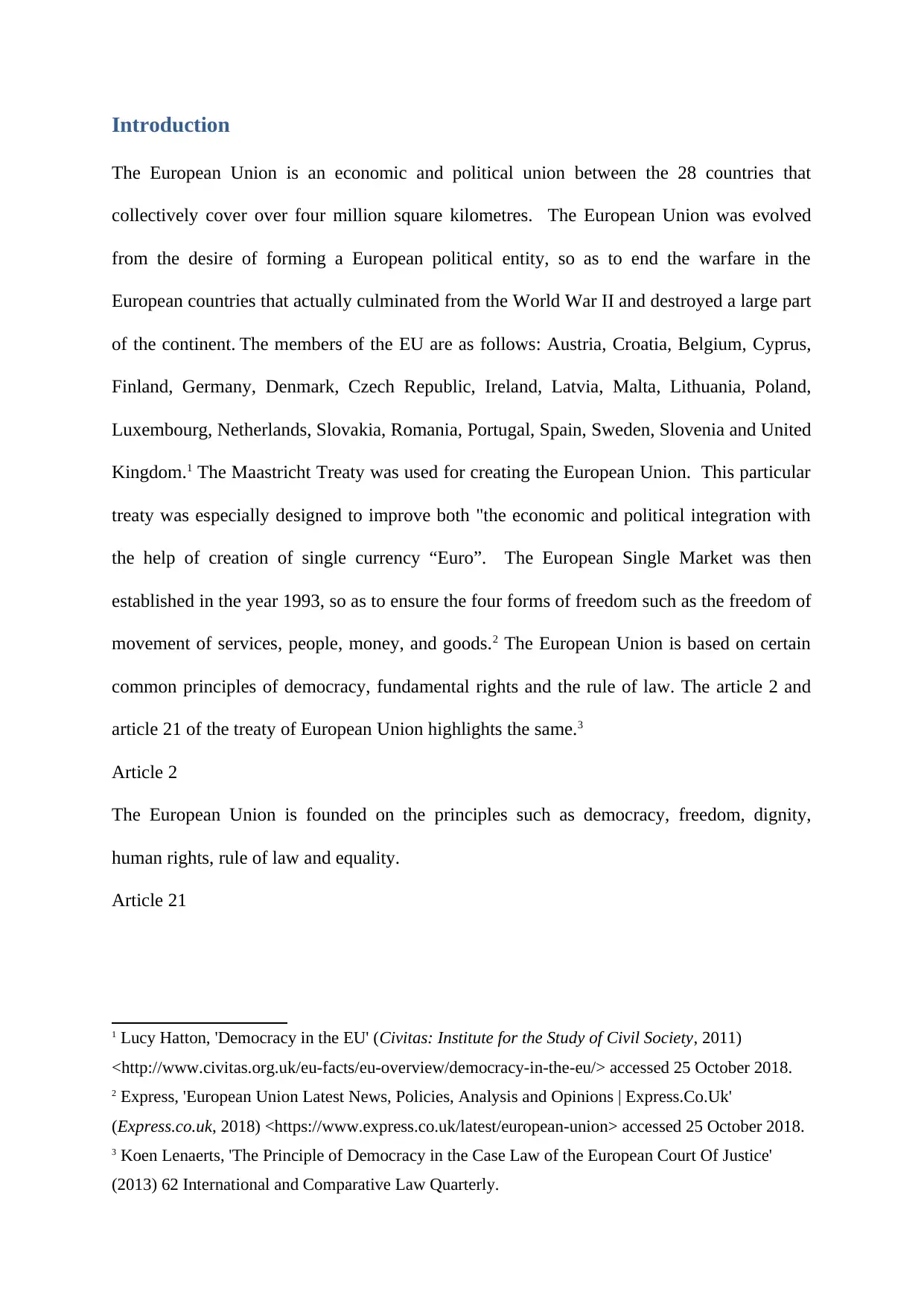
Introduction
The European Union is an economic and political union between the 28 countries that
collectively cover over four million square kilometres. The European Union was evolved
from the desire of forming a European political entity, so as to end the warfare in the
European countries that actually culminated from the World War II and destroyed a large part
of the continent. The members of the EU are as follows: Austria, Croatia, Belgium, Cyprus,
Finland, Germany, Denmark, Czech Republic, Ireland, Latvia, Malta, Lithuania, Poland,
Luxembourg, Netherlands, Slovakia, Romania, Portugal, Spain, Sweden, Slovenia and United
Kingdom.1 The Maastricht Treaty was used for creating the European Union. This particular
treaty was especially designed to improve both "the economic and political integration with
the help of creation of single currency “Euro”. The European Single Market was then
established in the year 1993, so as to ensure the four forms of freedom such as the freedom of
movement of services, people, money, and goods.2 The European Union is based on certain
common principles of democracy, fundamental rights and the rule of law. The article 2 and
article 21 of the treaty of European Union highlights the same.3
Article 2
The European Union is founded on the principles such as democracy, freedom, dignity,
human rights, rule of law and equality.
Article 21
1 Lucy Hatton, 'Democracy in the EU' (Civitas: Institute for the Study of Civil Society, 2011)
<http://www.civitas.org.uk/eu-facts/eu-overview/democracy-in-the-eu/> accessed 25 October 2018.
2 Express, 'European Union Latest News, Policies, Analysis and Opinions | Express.Co.Uk'
(Express.co.uk, 2018) <https://www.express.co.uk/latest/european-union> accessed 25 October 2018.
3 Koen Lenaerts, 'The Principle of Democracy in the Case Law of the European Court Of Justice'
(2013) 62 International and Comparative Law Quarterly.
The European Union is an economic and political union between the 28 countries that
collectively cover over four million square kilometres. The European Union was evolved
from the desire of forming a European political entity, so as to end the warfare in the
European countries that actually culminated from the World War II and destroyed a large part
of the continent. The members of the EU are as follows: Austria, Croatia, Belgium, Cyprus,
Finland, Germany, Denmark, Czech Republic, Ireland, Latvia, Malta, Lithuania, Poland,
Luxembourg, Netherlands, Slovakia, Romania, Portugal, Spain, Sweden, Slovenia and United
Kingdom.1 The Maastricht Treaty was used for creating the European Union. This particular
treaty was especially designed to improve both "the economic and political integration with
the help of creation of single currency “Euro”. The European Single Market was then
established in the year 1993, so as to ensure the four forms of freedom such as the freedom of
movement of services, people, money, and goods.2 The European Union is based on certain
common principles of democracy, fundamental rights and the rule of law. The article 2 and
article 21 of the treaty of European Union highlights the same.3
Article 2
The European Union is founded on the principles such as democracy, freedom, dignity,
human rights, rule of law and equality.
Article 21
1 Lucy Hatton, 'Democracy in the EU' (Civitas: Institute for the Study of Civil Society, 2011)
<http://www.civitas.org.uk/eu-facts/eu-overview/democracy-in-the-eu/> accessed 25 October 2018.
2 Express, 'European Union Latest News, Policies, Analysis and Opinions | Express.Co.Uk'
(Express.co.uk, 2018) <https://www.express.co.uk/latest/european-union> accessed 25 October 2018.
3 Koen Lenaerts, 'The Principle of Democracy in the Case Law of the European Court Of Justice'
(2013) 62 International and Comparative Law Quarterly.
⊘ This is a preview!⊘
Do you want full access?
Subscribe today to unlock all pages.

Trusted by 1+ million students worldwide
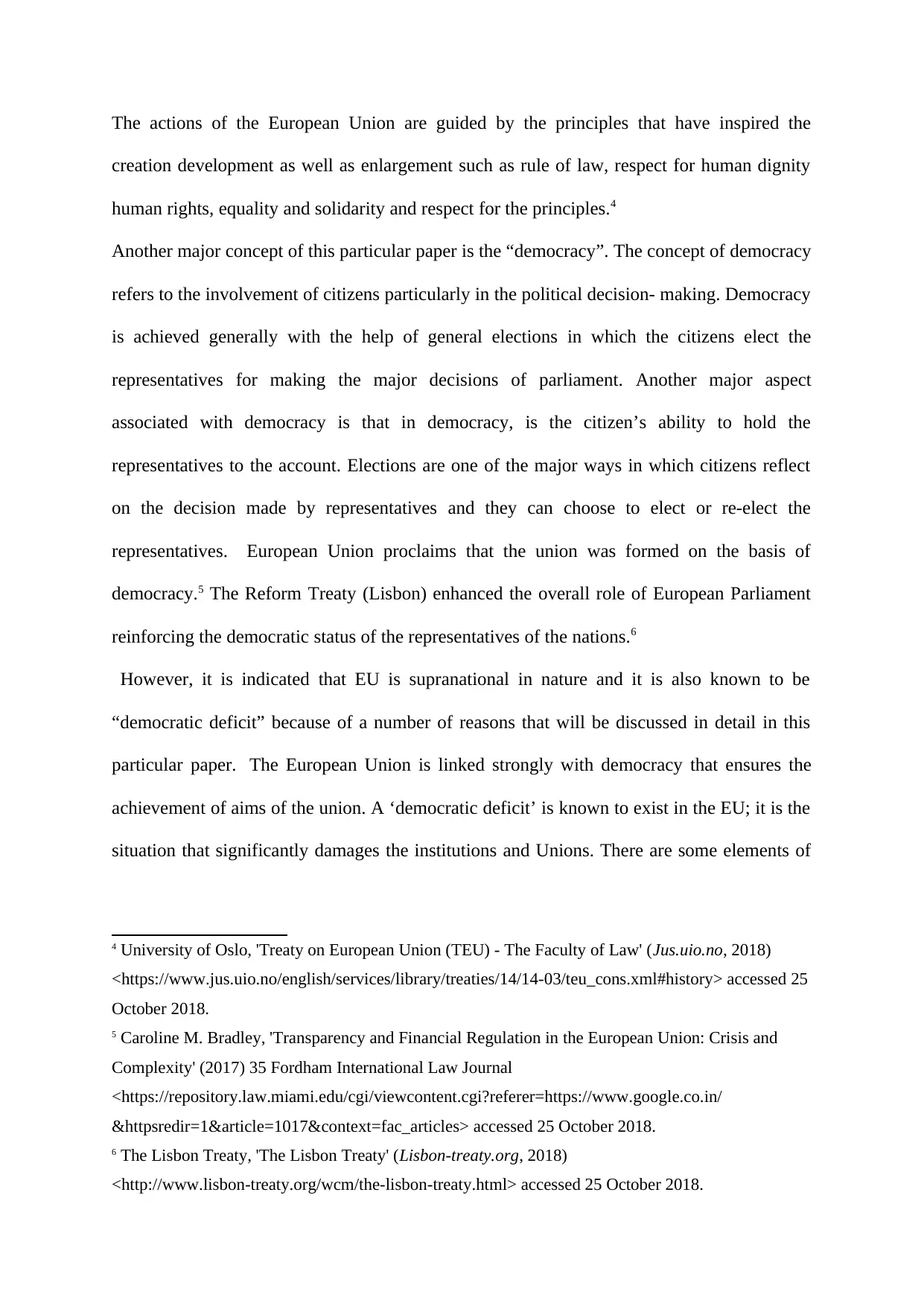
The actions of the European Union are guided by the principles that have inspired the
creation development as well as enlargement such as rule of law, respect for human dignity
human rights, equality and solidarity and respect for the principles.4
Another major concept of this particular paper is the “democracy”. The concept of democracy
refers to the involvement of citizens particularly in the political decision- making. Democracy
is achieved generally with the help of general elections in which the citizens elect the
representatives for making the major decisions of parliament. Another major aspect
associated with democracy is that in democracy, is the citizen’s ability to hold the
representatives to the account. Elections are one of the major ways in which citizens reflect
on the decision made by representatives and they can choose to elect or re-elect the
representatives. European Union proclaims that the union was formed on the basis of
democracy.5 The Reform Treaty (Lisbon) enhanced the overall role of European Parliament
reinforcing the democratic status of the representatives of the nations.6
However, it is indicated that EU is supranational in nature and it is also known to be
“democratic deficit” because of a number of reasons that will be discussed in detail in this
particular paper. The European Union is linked strongly with democracy that ensures the
achievement of aims of the union. A ‘democratic deficit’ is known to exist in the EU; it is the
situation that significantly damages the institutions and Unions. There are some elements of
4 University of Oslo, 'Treaty on European Union (TEU) - The Faculty of Law' (Jus.uio.no, 2018)
<https://www.jus.uio.no/english/services/library/treaties/14/14-03/teu_cons.xml#history> accessed 25
October 2018.
5 Caroline M. Bradley, 'Transparency and Financial Regulation in the European Union: Crisis and
Complexity' (2017) 35 Fordham International Law Journal
<https://repository.law.miami.edu/cgi/viewcontent.cgi?referer=https://www.google.co.in/
&httpsredir=1&article=1017&context=fac_articles> accessed 25 October 2018.
6 The Lisbon Treaty, 'The Lisbon Treaty' (Lisbon-treaty.org, 2018)
<http://www.lisbon-treaty.org/wcm/the-lisbon-treaty.html> accessed 25 October 2018.
creation development as well as enlargement such as rule of law, respect for human dignity
human rights, equality and solidarity and respect for the principles.4
Another major concept of this particular paper is the “democracy”. The concept of democracy
refers to the involvement of citizens particularly in the political decision- making. Democracy
is achieved generally with the help of general elections in which the citizens elect the
representatives for making the major decisions of parliament. Another major aspect
associated with democracy is that in democracy, is the citizen’s ability to hold the
representatives to the account. Elections are one of the major ways in which citizens reflect
on the decision made by representatives and they can choose to elect or re-elect the
representatives. European Union proclaims that the union was formed on the basis of
democracy.5 The Reform Treaty (Lisbon) enhanced the overall role of European Parliament
reinforcing the democratic status of the representatives of the nations.6
However, it is indicated that EU is supranational in nature and it is also known to be
“democratic deficit” because of a number of reasons that will be discussed in detail in this
particular paper. The European Union is linked strongly with democracy that ensures the
achievement of aims of the union. A ‘democratic deficit’ is known to exist in the EU; it is the
situation that significantly damages the institutions and Unions. There are some elements of
4 University of Oslo, 'Treaty on European Union (TEU) - The Faculty of Law' (Jus.uio.no, 2018)
<https://www.jus.uio.no/english/services/library/treaties/14/14-03/teu_cons.xml#history> accessed 25
October 2018.
5 Caroline M. Bradley, 'Transparency and Financial Regulation in the European Union: Crisis and
Complexity' (2017) 35 Fordham International Law Journal
<https://repository.law.miami.edu/cgi/viewcontent.cgi?referer=https://www.google.co.in/
&httpsredir=1&article=1017&context=fac_articles> accessed 25 October 2018.
6 The Lisbon Treaty, 'The Lisbon Treaty' (Lisbon-treaty.org, 2018)
<http://www.lisbon-treaty.org/wcm/the-lisbon-treaty.html> accessed 25 October 2018.
Paraphrase This Document
Need a fresh take? Get an instant paraphrase of this document with our AI Paraphraser
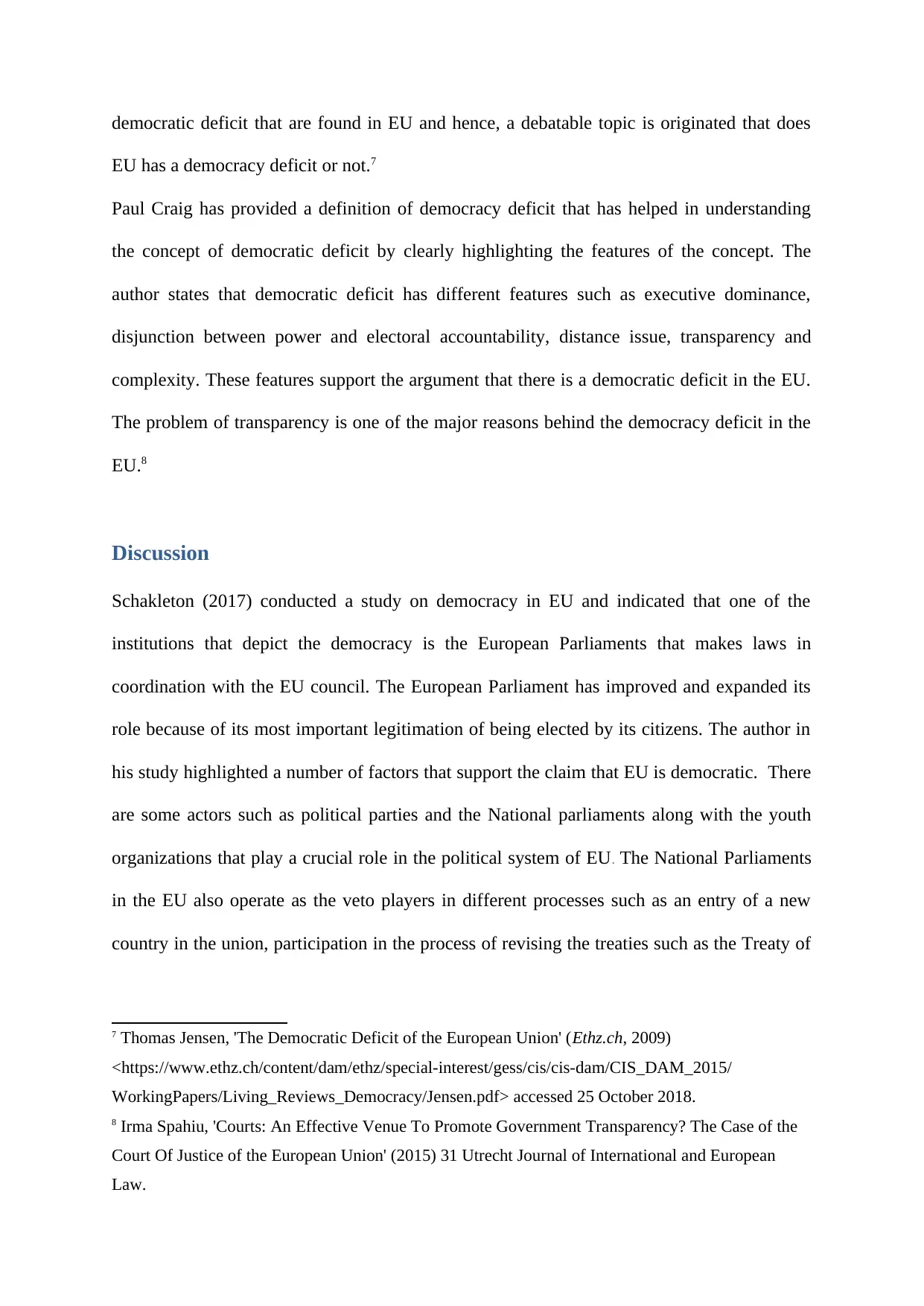
democratic deficit that are found in EU and hence, a debatable topic is originated that does
EU has a democracy deficit or not.7
Paul Craig has provided a definition of democracy deficit that has helped in understanding
the concept of democratic deficit by clearly highlighting the features of the concept. The
author states that democratic deficit has different features such as executive dominance,
disjunction between power and electoral accountability, distance issue, transparency and
complexity. These features support the argument that there is a democratic deficit in the EU.
The problem of transparency is one of the major reasons behind the democracy deficit in the
EU.8
Discussion
Schakleton (2017) conducted a study on democracy in EU and indicated that one of the
institutions that depict the democracy is the European Parliaments that makes laws in
coordination with the EU council. The European Parliament has improved and expanded its
role because of its most important legitimation of being elected by its citizens. The author in
his study highlighted a number of factors that support the claim that EU is democratic. There
are some actors such as political parties and the National parliaments along with the youth
organizations that play a crucial role in the political system of EU. The National Parliaments
in the EU also operate as the veto players in different processes such as an entry of a new
country in the union, participation in the process of revising the treaties such as the Treaty of
7 Thomas Jensen, 'The Democratic Deficit of the European Union' (Ethz.ch, 2009)
<https://www.ethz.ch/content/dam/ethz/special-interest/gess/cis/cis-dam/CIS_DAM_2015/
WorkingPapers/Living_Reviews_Democracy/Jensen.pdf> accessed 25 October 2018.
8 Irma Spahiu, 'Courts: An Effective Venue To Promote Government Transparency? The Case of the
Court Of Justice of the European Union' (2015) 31 Utrecht Journal of International and European
Law.
EU has a democracy deficit or not.7
Paul Craig has provided a definition of democracy deficit that has helped in understanding
the concept of democratic deficit by clearly highlighting the features of the concept. The
author states that democratic deficit has different features such as executive dominance,
disjunction between power and electoral accountability, distance issue, transparency and
complexity. These features support the argument that there is a democratic deficit in the EU.
The problem of transparency is one of the major reasons behind the democracy deficit in the
EU.8
Discussion
Schakleton (2017) conducted a study on democracy in EU and indicated that one of the
institutions that depict the democracy is the European Parliaments that makes laws in
coordination with the EU council. The European Parliament has improved and expanded its
role because of its most important legitimation of being elected by its citizens. The author in
his study highlighted a number of factors that support the claim that EU is democratic. There
are some actors such as political parties and the National parliaments along with the youth
organizations that play a crucial role in the political system of EU. The National Parliaments
in the EU also operate as the veto players in different processes such as an entry of a new
country in the union, participation in the process of revising the treaties such as the Treaty of
7 Thomas Jensen, 'The Democratic Deficit of the European Union' (Ethz.ch, 2009)
<https://www.ethz.ch/content/dam/ethz/special-interest/gess/cis/cis-dam/CIS_DAM_2015/
WorkingPapers/Living_Reviews_Democracy/Jensen.pdf> accessed 25 October 2018.
8 Irma Spahiu, 'Courts: An Effective Venue To Promote Government Transparency? The Case of the
Court Of Justice of the European Union' (2015) 31 Utrecht Journal of International and European
Law.
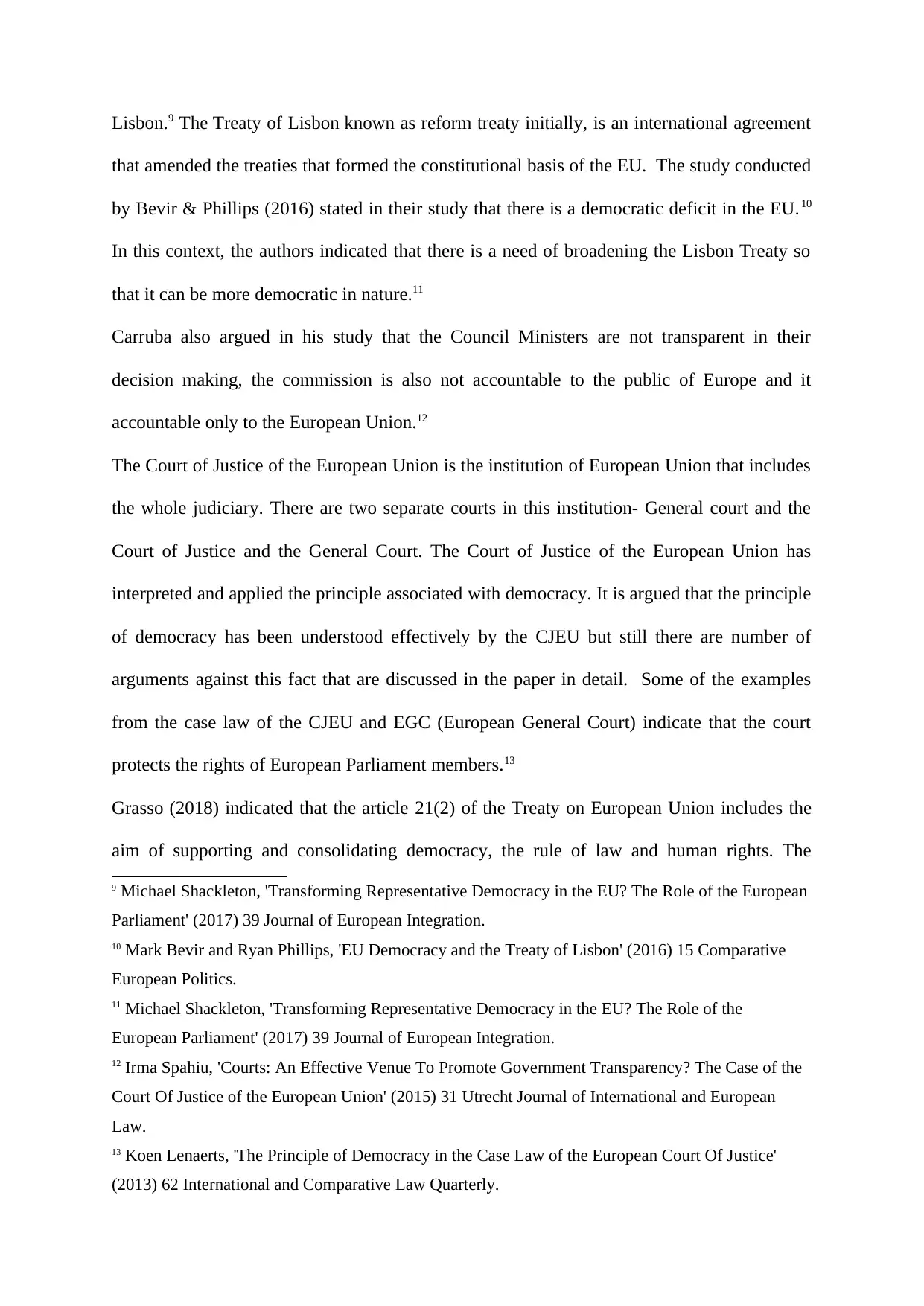
Lisbon.9 The Treaty of Lisbon known as reform treaty initially, is an international agreement
that amended the treaties that formed the constitutional basis of the EU. The study conducted
by Bevir & Phillips (2016) stated in their study that there is a democratic deficit in the EU.10
In this context, the authors indicated that there is a need of broadening the Lisbon Treaty so
that it can be more democratic in nature.11
Carruba also argued in his study that the Council Ministers are not transparent in their
decision making, the commission is also not accountable to the public of Europe and it
accountable only to the European Union.12
The Court of Justice of the European Union is the institution of European Union that includes
the whole judiciary. There are two separate courts in this institution- General court and the
Court of Justice and the General Court. The Court of Justice of the European Union has
interpreted and applied the principle associated with democracy. It is argued that the principle
of democracy has been understood effectively by the CJEU but still there are number of
arguments against this fact that are discussed in the paper in detail. Some of the examples
from the case law of the CJEU and EGC (European General Court) indicate that the court
protects the rights of European Parliament members.13
Grasso (2018) indicated that the article 21(2) of the Treaty on European Union includes the
aim of supporting and consolidating democracy, the rule of law and human rights. The
9 Michael Shackleton, 'Transforming Representative Democracy in the EU? The Role of the European
Parliament' (2017) 39 Journal of European Integration.
10 Mark Bevir and Ryan Phillips, 'EU Democracy and the Treaty of Lisbon' (2016) 15 Comparative
European Politics.
11 Michael Shackleton, 'Transforming Representative Democracy in the EU? The Role of the
European Parliament' (2017) 39 Journal of European Integration.
12 Irma Spahiu, 'Courts: An Effective Venue To Promote Government Transparency? The Case of the
Court Of Justice of the European Union' (2015) 31 Utrecht Journal of International and European
Law.
13 Koen Lenaerts, 'The Principle of Democracy in the Case Law of the European Court Of Justice'
(2013) 62 International and Comparative Law Quarterly.
that amended the treaties that formed the constitutional basis of the EU. The study conducted
by Bevir & Phillips (2016) stated in their study that there is a democratic deficit in the EU.10
In this context, the authors indicated that there is a need of broadening the Lisbon Treaty so
that it can be more democratic in nature.11
Carruba also argued in his study that the Council Ministers are not transparent in their
decision making, the commission is also not accountable to the public of Europe and it
accountable only to the European Union.12
The Court of Justice of the European Union is the institution of European Union that includes
the whole judiciary. There are two separate courts in this institution- General court and the
Court of Justice and the General Court. The Court of Justice of the European Union has
interpreted and applied the principle associated with democracy. It is argued that the principle
of democracy has been understood effectively by the CJEU but still there are number of
arguments against this fact that are discussed in the paper in detail. Some of the examples
from the case law of the CJEU and EGC (European General Court) indicate that the court
protects the rights of European Parliament members.13
Grasso (2018) indicated that the article 21(2) of the Treaty on European Union includes the
aim of supporting and consolidating democracy, the rule of law and human rights. The
9 Michael Shackleton, 'Transforming Representative Democracy in the EU? The Role of the European
Parliament' (2017) 39 Journal of European Integration.
10 Mark Bevir and Ryan Phillips, 'EU Democracy and the Treaty of Lisbon' (2016) 15 Comparative
European Politics.
11 Michael Shackleton, 'Transforming Representative Democracy in the EU? The Role of the
European Parliament' (2017) 39 Journal of European Integration.
12 Irma Spahiu, 'Courts: An Effective Venue To Promote Government Transparency? The Case of the
Court Of Justice of the European Union' (2015) 31 Utrecht Journal of International and European
Law.
13 Koen Lenaerts, 'The Principle of Democracy in the Case Law of the European Court Of Justice'
(2013) 62 International and Comparative Law Quarterly.
⊘ This is a preview!⊘
Do you want full access?
Subscribe today to unlock all pages.

Trusted by 1+ million students worldwide
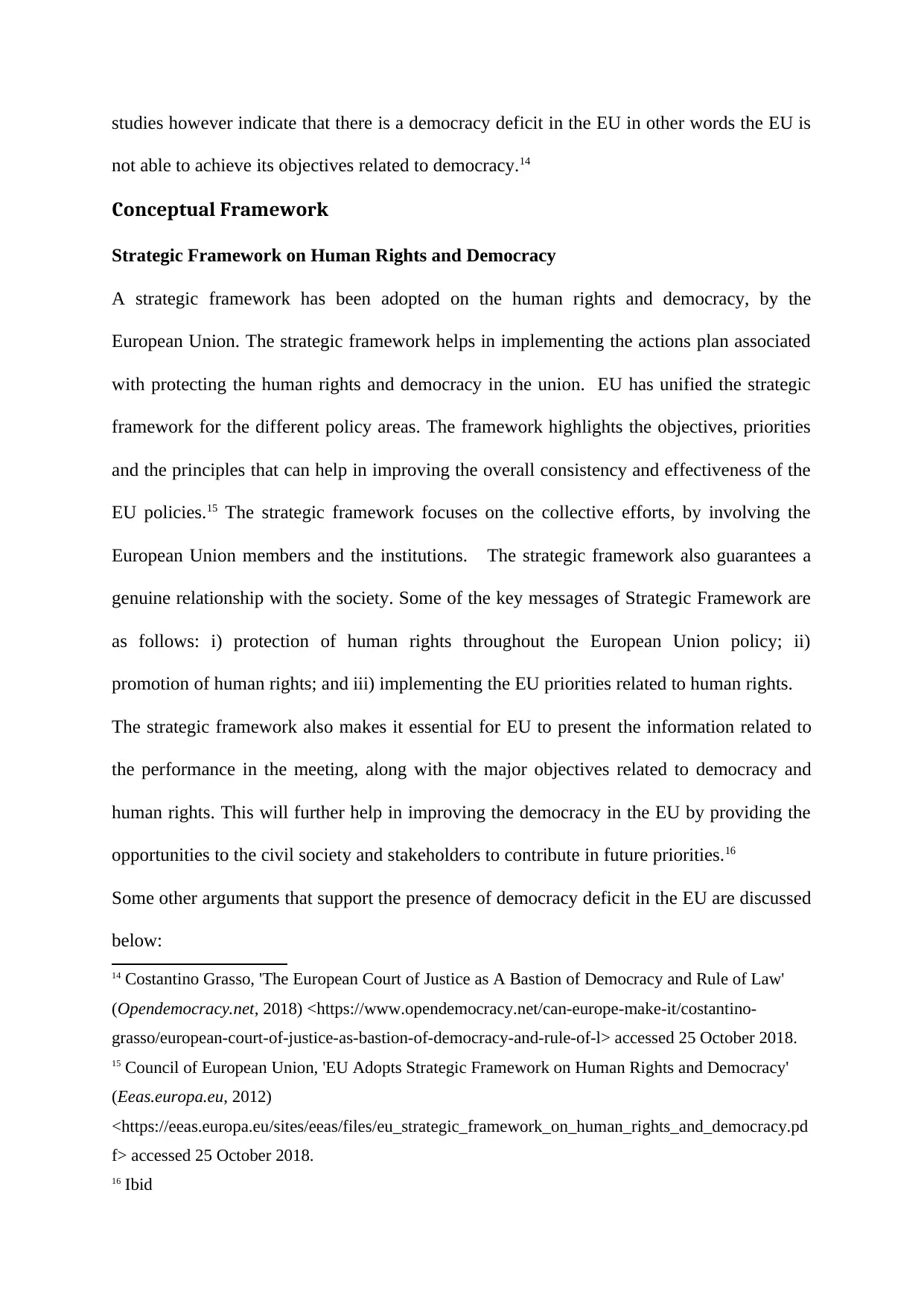
studies however indicate that there is a democracy deficit in the EU in other words the EU is
not able to achieve its objectives related to democracy.14
Conceptual Framework
Strategic Framework on Human Rights and Democracy
A strategic framework has been adopted on the human rights and democracy, by the
European Union. The strategic framework helps in implementing the actions plan associated
with protecting the human rights and democracy in the union. EU has unified the strategic
framework for the different policy areas. The framework highlights the objectives, priorities
and the principles that can help in improving the overall consistency and effectiveness of the
EU policies.15 The strategic framework focuses on the collective efforts, by involving the
European Union members and the institutions. The strategic framework also guarantees a
genuine relationship with the society. Some of the key messages of Strategic Framework are
as follows: i) protection of human rights throughout the European Union policy; ii)
promotion of human rights; and iii) implementing the EU priorities related to human rights.
The strategic framework also makes it essential for EU to present the information related to
the performance in the meeting, along with the major objectives related to democracy and
human rights. This will further help in improving the democracy in the EU by providing the
opportunities to the civil society and stakeholders to contribute in future priorities.16
Some other arguments that support the presence of democracy deficit in the EU are discussed
below:
14 Costantino Grasso, 'The European Court of Justice as A Bastion of Democracy and Rule of Law'
(Opendemocracy.net, 2018) <https://www.opendemocracy.net/can-europe-make-it/costantino-
grasso/european-court-of-justice-as-bastion-of-democracy-and-rule-of-l> accessed 25 October 2018.
15 Council of European Union, 'EU Adopts Strategic Framework on Human Rights and Democracy'
(Eeas.europa.eu, 2012)
<https://eeas.europa.eu/sites/eeas/files/eu_strategic_framework_on_human_rights_and_democracy.pd
f> accessed 25 October 2018.
16 Ibid
not able to achieve its objectives related to democracy.14
Conceptual Framework
Strategic Framework on Human Rights and Democracy
A strategic framework has been adopted on the human rights and democracy, by the
European Union. The strategic framework helps in implementing the actions plan associated
with protecting the human rights and democracy in the union. EU has unified the strategic
framework for the different policy areas. The framework highlights the objectives, priorities
and the principles that can help in improving the overall consistency and effectiveness of the
EU policies.15 The strategic framework focuses on the collective efforts, by involving the
European Union members and the institutions. The strategic framework also guarantees a
genuine relationship with the society. Some of the key messages of Strategic Framework are
as follows: i) protection of human rights throughout the European Union policy; ii)
promotion of human rights; and iii) implementing the EU priorities related to human rights.
The strategic framework also makes it essential for EU to present the information related to
the performance in the meeting, along with the major objectives related to democracy and
human rights. This will further help in improving the democracy in the EU by providing the
opportunities to the civil society and stakeholders to contribute in future priorities.16
Some other arguments that support the presence of democracy deficit in the EU are discussed
below:
14 Costantino Grasso, 'The European Court of Justice as A Bastion of Democracy and Rule of Law'
(Opendemocracy.net, 2018) <https://www.opendemocracy.net/can-europe-make-it/costantino-
grasso/european-court-of-justice-as-bastion-of-democracy-and-rule-of-l> accessed 25 October 2018.
15 Council of European Union, 'EU Adopts Strategic Framework on Human Rights and Democracy'
(Eeas.europa.eu, 2012)
<https://eeas.europa.eu/sites/eeas/files/eu_strategic_framework_on_human_rights_and_democracy.pd
f> accessed 25 October 2018.
16 Ibid
Paraphrase This Document
Need a fresh take? Get an instant paraphrase of this document with our AI Paraphraser
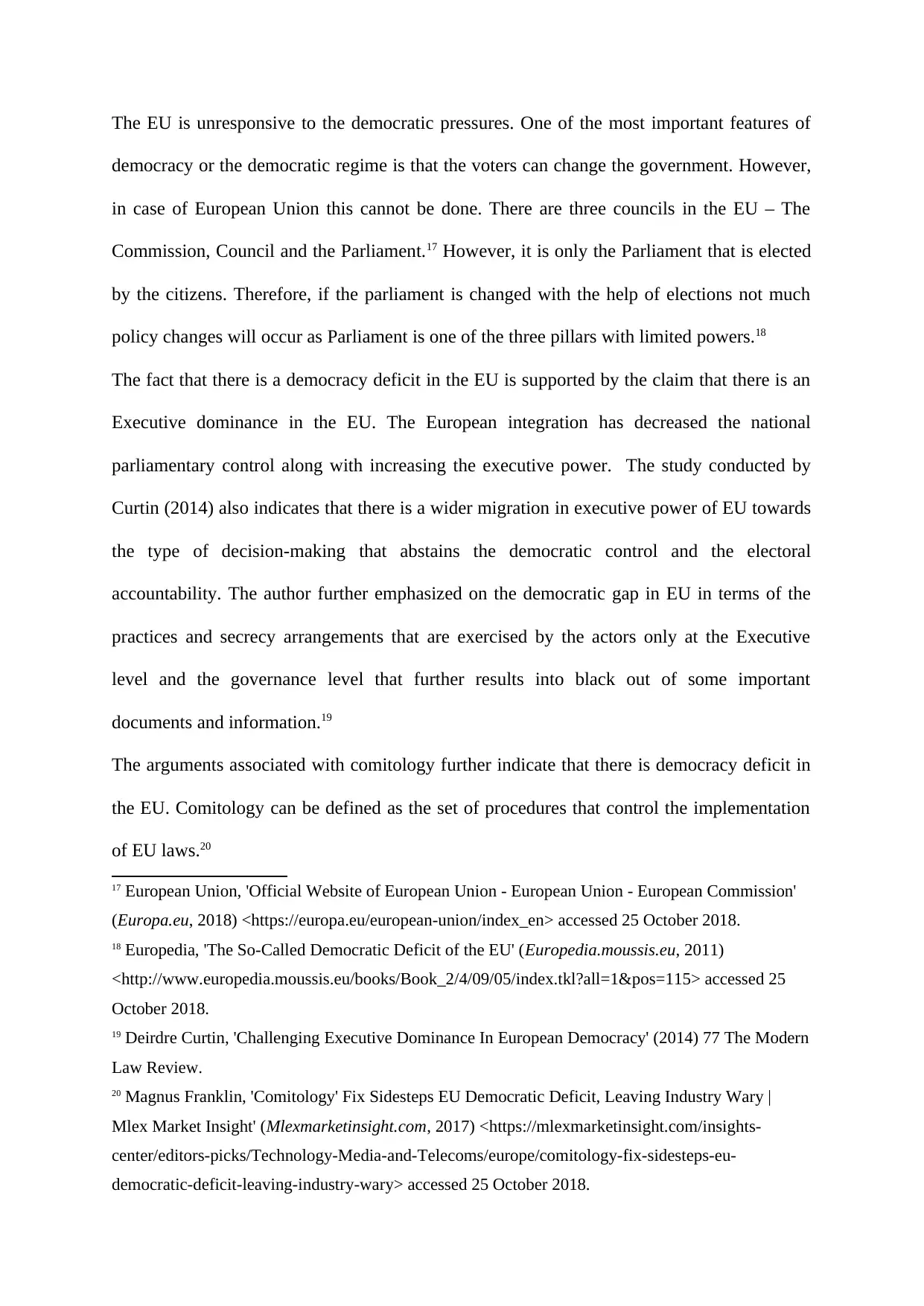
The EU is unresponsive to the democratic pressures. One of the most important features of
democracy or the democratic regime is that the voters can change the government. However,
in case of European Union this cannot be done. There are three councils in the EU – The
Commission, Council and the Parliament.17 However, it is only the Parliament that is elected
by the citizens. Therefore, if the parliament is changed with the help of elections not much
policy changes will occur as Parliament is one of the three pillars with limited powers.18
The fact that there is a democracy deficit in the EU is supported by the claim that there is an
Executive dominance in the EU. The European integration has decreased the national
parliamentary control along with increasing the executive power. The study conducted by
Curtin (2014) also indicates that there is a wider migration in executive power of EU towards
the type of decision-making that abstains the democratic control and the electoral
accountability. The author further emphasized on the democratic gap in EU in terms of the
practices and secrecy arrangements that are exercised by the actors only at the Executive
level and the governance level that further results into black out of some important
documents and information.19
The arguments associated with comitology further indicate that there is democracy deficit in
the EU. Comitology can be defined as the set of procedures that control the implementation
of EU laws.20
17 European Union, 'Official Website of European Union - European Union - European Commission'
(Europa.eu, 2018) <https://europa.eu/european-union/index_en> accessed 25 October 2018.
18 Europedia, 'The So-Called Democratic Deficit of the EU' (Europedia.moussis.eu, 2011)
<http://www.europedia.moussis.eu/books/Book_2/4/09/05/index.tkl?all=1&pos=115> accessed 25
October 2018.
19 Deirdre Curtin, 'Challenging Executive Dominance In European Democracy' (2014) 77 The Modern
Law Review.
20 Magnus Franklin, 'Comitology' Fix Sidesteps EU Democratic Deficit, Leaving Industry Wary |
Mlex Market Insight' (Mlexmarketinsight.com, 2017) <https://mlexmarketinsight.com/insights-
center/editors-picks/Technology-Media-and-Telecoms/europe/comitology-fix-sidesteps-eu-
democratic-deficit-leaving-industry-wary> accessed 25 October 2018.
democracy or the democratic regime is that the voters can change the government. However,
in case of European Union this cannot be done. There are three councils in the EU – The
Commission, Council and the Parliament.17 However, it is only the Parliament that is elected
by the citizens. Therefore, if the parliament is changed with the help of elections not much
policy changes will occur as Parliament is one of the three pillars with limited powers.18
The fact that there is a democracy deficit in the EU is supported by the claim that there is an
Executive dominance in the EU. The European integration has decreased the national
parliamentary control along with increasing the executive power. The study conducted by
Curtin (2014) also indicates that there is a wider migration in executive power of EU towards
the type of decision-making that abstains the democratic control and the electoral
accountability. The author further emphasized on the democratic gap in EU in terms of the
practices and secrecy arrangements that are exercised by the actors only at the Executive
level and the governance level that further results into black out of some important
documents and information.19
The arguments associated with comitology further indicate that there is democracy deficit in
the EU. Comitology can be defined as the set of procedures that control the implementation
of EU laws.20
17 European Union, 'Official Website of European Union - European Union - European Commission'
(Europa.eu, 2018) <https://europa.eu/european-union/index_en> accessed 25 October 2018.
18 Europedia, 'The So-Called Democratic Deficit of the EU' (Europedia.moussis.eu, 2011)
<http://www.europedia.moussis.eu/books/Book_2/4/09/05/index.tkl?all=1&pos=115> accessed 25
October 2018.
19 Deirdre Curtin, 'Challenging Executive Dominance In European Democracy' (2014) 77 The Modern
Law Review.
20 Magnus Franklin, 'Comitology' Fix Sidesteps EU Democratic Deficit, Leaving Industry Wary |
Mlex Market Insight' (Mlexmarketinsight.com, 2017) <https://mlexmarketinsight.com/insights-
center/editors-picks/Technology-Media-and-Telecoms/europe/comitology-fix-sidesteps-eu-
democratic-deficit-leaving-industry-wary> accessed 25 October 2018.
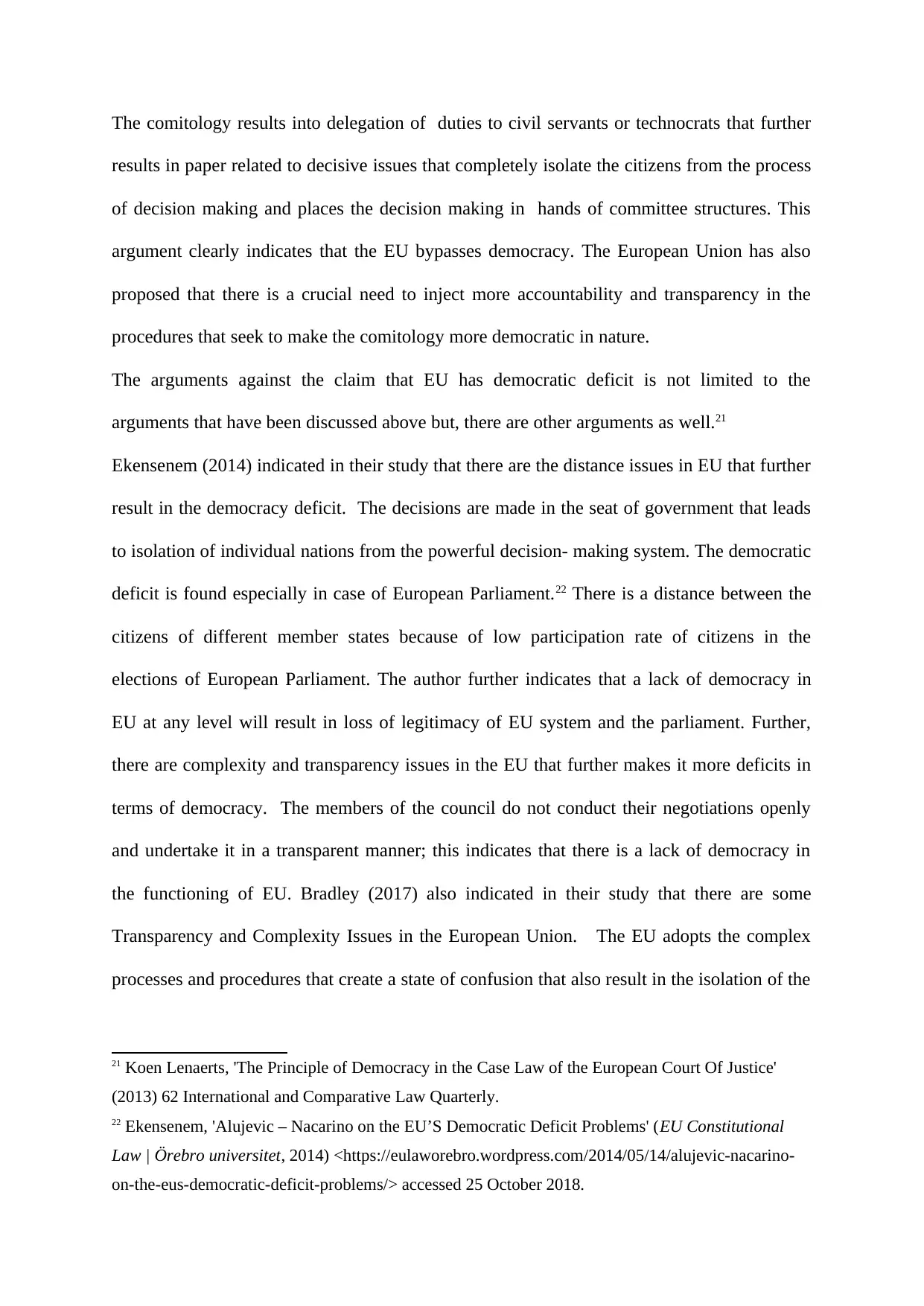
The comitology results into delegation of duties to civil servants or technocrats that further
results in paper related to decisive issues that completely isolate the citizens from the process
of decision making and places the decision making in hands of committee structures. This
argument clearly indicates that the EU bypasses democracy. The European Union has also
proposed that there is a crucial need to inject more accountability and transparency in the
procedures that seek to make the comitology more democratic in nature.
The arguments against the claim that EU has democratic deficit is not limited to the
arguments that have been discussed above but, there are other arguments as well.21
Ekensenem (2014) indicated in their study that there are the distance issues in EU that further
result in the democracy deficit. The decisions are made in the seat of government that leads
to isolation of individual nations from the powerful decision- making system. The democratic
deficit is found especially in case of European Parliament.22 There is a distance between the
citizens of different member states because of low participation rate of citizens in the
elections of European Parliament. The author further indicates that a lack of democracy in
EU at any level will result in loss of legitimacy of EU system and the parliament. Further,
there are complexity and transparency issues in the EU that further makes it more deficits in
terms of democracy. The members of the council do not conduct their negotiations openly
and undertake it in a transparent manner; this indicates that there is a lack of democracy in
the functioning of EU. Bradley (2017) also indicated in their study that there are some
Transparency and Complexity Issues in the European Union. The EU adopts the complex
processes and procedures that create a state of confusion that also result in the isolation of the
21 Koen Lenaerts, 'The Principle of Democracy in the Case Law of the European Court Of Justice'
(2013) 62 International and Comparative Law Quarterly.
22 Ekensenem, 'Alujevic – Nacarino on the EU’S Democratic Deficit Problems' (EU Constitutional
Law | Örebro universitet, 2014) <https://eulaworebro.wordpress.com/2014/05/14/alujevic-nacarino-
on-the-eus-democratic-deficit-problems/> accessed 25 October 2018.
results in paper related to decisive issues that completely isolate the citizens from the process
of decision making and places the decision making in hands of committee structures. This
argument clearly indicates that the EU bypasses democracy. The European Union has also
proposed that there is a crucial need to inject more accountability and transparency in the
procedures that seek to make the comitology more democratic in nature.
The arguments against the claim that EU has democratic deficit is not limited to the
arguments that have been discussed above but, there are other arguments as well.21
Ekensenem (2014) indicated in their study that there are the distance issues in EU that further
result in the democracy deficit. The decisions are made in the seat of government that leads
to isolation of individual nations from the powerful decision- making system. The democratic
deficit is found especially in case of European Parliament.22 There is a distance between the
citizens of different member states because of low participation rate of citizens in the
elections of European Parliament. The author further indicates that a lack of democracy in
EU at any level will result in loss of legitimacy of EU system and the parliament. Further,
there are complexity and transparency issues in the EU that further makes it more deficits in
terms of democracy. The members of the council do not conduct their negotiations openly
and undertake it in a transparent manner; this indicates that there is a lack of democracy in
the functioning of EU. Bradley (2017) also indicated in their study that there are some
Transparency and Complexity Issues in the European Union. The EU adopts the complex
processes and procedures that create a state of confusion that also result in the isolation of the
21 Koen Lenaerts, 'The Principle of Democracy in the Case Law of the European Court Of Justice'
(2013) 62 International and Comparative Law Quarterly.
22 Ekensenem, 'Alujevic – Nacarino on the EU’S Democratic Deficit Problems' (EU Constitutional
Law | Örebro universitet, 2014) <https://eulaworebro.wordpress.com/2014/05/14/alujevic-nacarino-
on-the-eus-democratic-deficit-problems/> accessed 25 October 2018.
⊘ This is a preview!⊘
Do you want full access?
Subscribe today to unlock all pages.

Trusted by 1+ million students worldwide
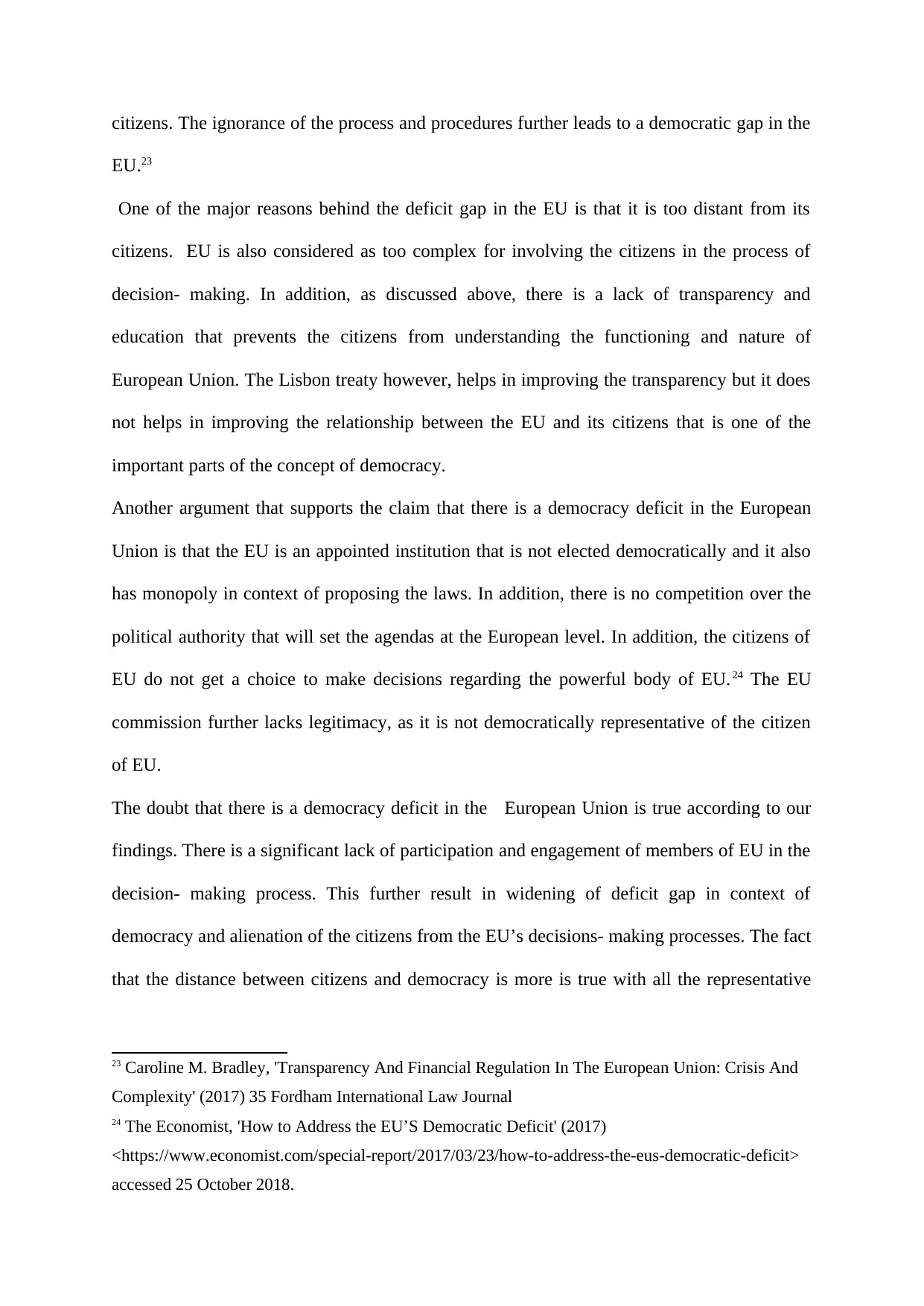
citizens. The ignorance of the process and procedures further leads to a democratic gap in the
EU.23
One of the major reasons behind the deficit gap in the EU is that it is too distant from its
citizens. EU is also considered as too complex for involving the citizens in the process of
decision- making. In addition, as discussed above, there is a lack of transparency and
education that prevents the citizens from understanding the functioning and nature of
European Union. The Lisbon treaty however, helps in improving the transparency but it does
not helps in improving the relationship between the EU and its citizens that is one of the
important parts of the concept of democracy.
Another argument that supports the claim that there is a democracy deficit in the European
Union is that the EU is an appointed institution that is not elected democratically and it also
has monopoly in context of proposing the laws. In addition, there is no competition over the
political authority that will set the agendas at the European level. In addition, the citizens of
EU do not get a choice to make decisions regarding the powerful body of EU.24 The EU
commission further lacks legitimacy, as it is not democratically representative of the citizen
of EU.
The doubt that there is a democracy deficit in the European Union is true according to our
findings. There is a significant lack of participation and engagement of members of EU in the
decision- making process. This further result in widening of deficit gap in context of
democracy and alienation of the citizens from the EU’s decisions- making processes. The fact
that the distance between citizens and democracy is more is true with all the representative
23 Caroline M. Bradley, 'Transparency And Financial Regulation In The European Union: Crisis And
Complexity' (2017) 35 Fordham International Law Journal
24 The Economist, 'How to Address the EU’S Democratic Deficit' (2017)
<https://www.economist.com/special-report/2017/03/23/how-to-address-the-eus-democratic-deficit>
accessed 25 October 2018.
EU.23
One of the major reasons behind the deficit gap in the EU is that it is too distant from its
citizens. EU is also considered as too complex for involving the citizens in the process of
decision- making. In addition, as discussed above, there is a lack of transparency and
education that prevents the citizens from understanding the functioning and nature of
European Union. The Lisbon treaty however, helps in improving the transparency but it does
not helps in improving the relationship between the EU and its citizens that is one of the
important parts of the concept of democracy.
Another argument that supports the claim that there is a democracy deficit in the European
Union is that the EU is an appointed institution that is not elected democratically and it also
has monopoly in context of proposing the laws. In addition, there is no competition over the
political authority that will set the agendas at the European level. In addition, the citizens of
EU do not get a choice to make decisions regarding the powerful body of EU.24 The EU
commission further lacks legitimacy, as it is not democratically representative of the citizen
of EU.
The doubt that there is a democracy deficit in the European Union is true according to our
findings. There is a significant lack of participation and engagement of members of EU in the
decision- making process. This further result in widening of deficit gap in context of
democracy and alienation of the citizens from the EU’s decisions- making processes. The fact
that the distance between citizens and democracy is more is true with all the representative
23 Caroline M. Bradley, 'Transparency And Financial Regulation In The European Union: Crisis And
Complexity' (2017) 35 Fordham International Law Journal
24 The Economist, 'How to Address the EU’S Democratic Deficit' (2017)
<https://www.economist.com/special-report/2017/03/23/how-to-address-the-eus-democratic-deficit>
accessed 25 October 2018.
Paraphrase This Document
Need a fresh take? Get an instant paraphrase of this document with our AI Paraphraser
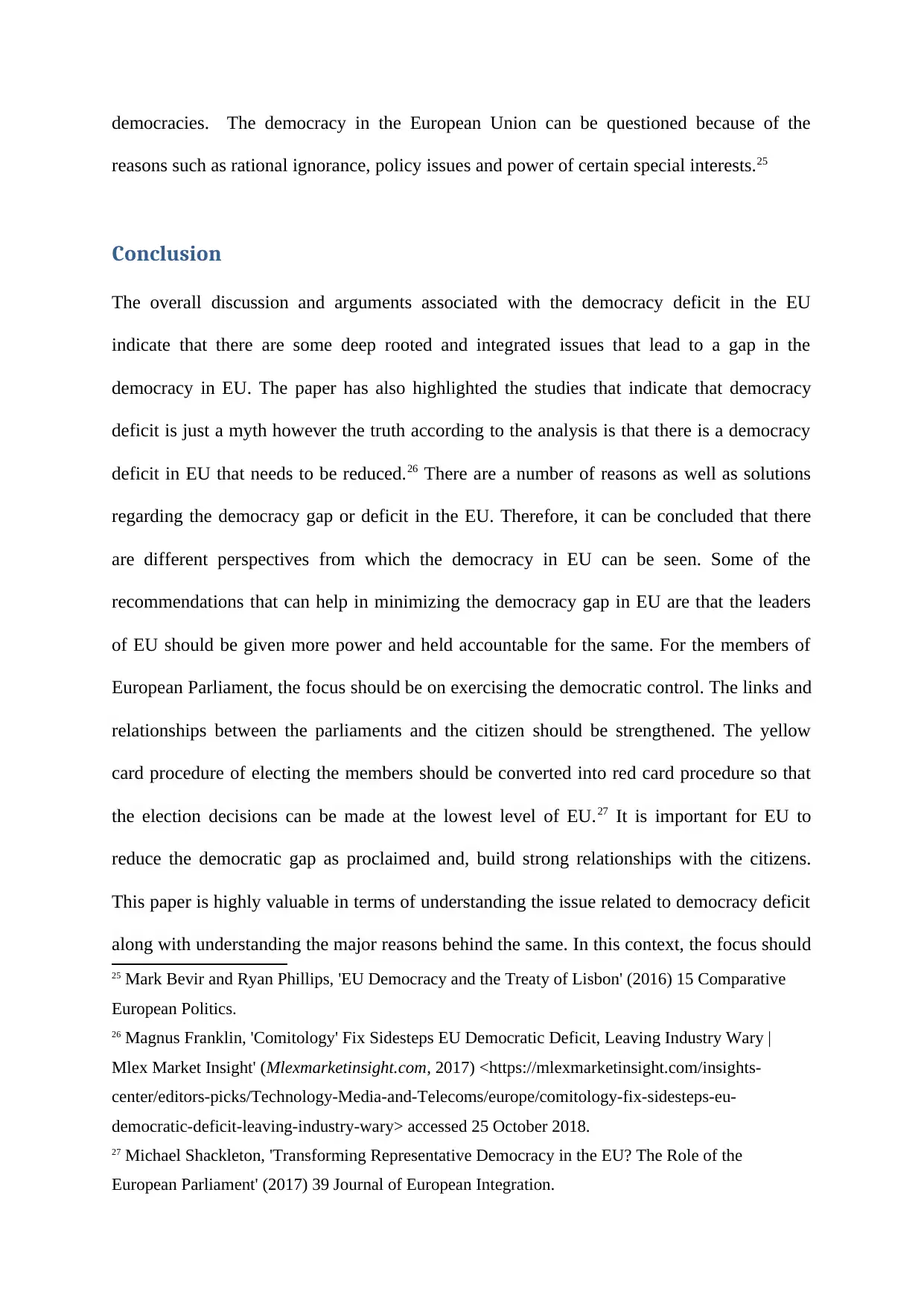
democracies. The democracy in the European Union can be questioned because of the
reasons such as rational ignorance, policy issues and power of certain special interests.25
Conclusion
The overall discussion and arguments associated with the democracy deficit in the EU
indicate that there are some deep rooted and integrated issues that lead to a gap in the
democracy in EU. The paper has also highlighted the studies that indicate that democracy
deficit is just a myth however the truth according to the analysis is that there is a democracy
deficit in EU that needs to be reduced.26 There are a number of reasons as well as solutions
regarding the democracy gap or deficit in the EU. Therefore, it can be concluded that there
are different perspectives from which the democracy in EU can be seen. Some of the
recommendations that can help in minimizing the democracy gap in EU are that the leaders
of EU should be given more power and held accountable for the same. For the members of
European Parliament, the focus should be on exercising the democratic control. The links and
relationships between the parliaments and the citizen should be strengthened. The yellow
card procedure of electing the members should be converted into red card procedure so that
the election decisions can be made at the lowest level of EU.27 It is important for EU to
reduce the democratic gap as proclaimed and, build strong relationships with the citizens.
This paper is highly valuable in terms of understanding the issue related to democracy deficit
along with understanding the major reasons behind the same. In this context, the focus should
25 Mark Bevir and Ryan Phillips, 'EU Democracy and the Treaty of Lisbon' (2016) 15 Comparative
European Politics.
26 Magnus Franklin, 'Comitology' Fix Sidesteps EU Democratic Deficit, Leaving Industry Wary |
Mlex Market Insight' (Mlexmarketinsight.com, 2017) <https://mlexmarketinsight.com/insights-
center/editors-picks/Technology-Media-and-Telecoms/europe/comitology-fix-sidesteps-eu-
democratic-deficit-leaving-industry-wary> accessed 25 October 2018.
27 Michael Shackleton, 'Transforming Representative Democracy in the EU? The Role of the
European Parliament' (2017) 39 Journal of European Integration.
reasons such as rational ignorance, policy issues and power of certain special interests.25
Conclusion
The overall discussion and arguments associated with the democracy deficit in the EU
indicate that there are some deep rooted and integrated issues that lead to a gap in the
democracy in EU. The paper has also highlighted the studies that indicate that democracy
deficit is just a myth however the truth according to the analysis is that there is a democracy
deficit in EU that needs to be reduced.26 There are a number of reasons as well as solutions
regarding the democracy gap or deficit in the EU. Therefore, it can be concluded that there
are different perspectives from which the democracy in EU can be seen. Some of the
recommendations that can help in minimizing the democracy gap in EU are that the leaders
of EU should be given more power and held accountable for the same. For the members of
European Parliament, the focus should be on exercising the democratic control. The links and
relationships between the parliaments and the citizen should be strengthened. The yellow
card procedure of electing the members should be converted into red card procedure so that
the election decisions can be made at the lowest level of EU.27 It is important for EU to
reduce the democratic gap as proclaimed and, build strong relationships with the citizens.
This paper is highly valuable in terms of understanding the issue related to democracy deficit
along with understanding the major reasons behind the same. In this context, the focus should
25 Mark Bevir and Ryan Phillips, 'EU Democracy and the Treaty of Lisbon' (2016) 15 Comparative
European Politics.
26 Magnus Franklin, 'Comitology' Fix Sidesteps EU Democratic Deficit, Leaving Industry Wary |
Mlex Market Insight' (Mlexmarketinsight.com, 2017) <https://mlexmarketinsight.com/insights-
center/editors-picks/Technology-Media-and-Telecoms/europe/comitology-fix-sidesteps-eu-
democratic-deficit-leaving-industry-wary> accessed 25 October 2018.
27 Michael Shackleton, 'Transforming Representative Democracy in the EU? The Role of the
European Parliament' (2017) 39 Journal of European Integration.
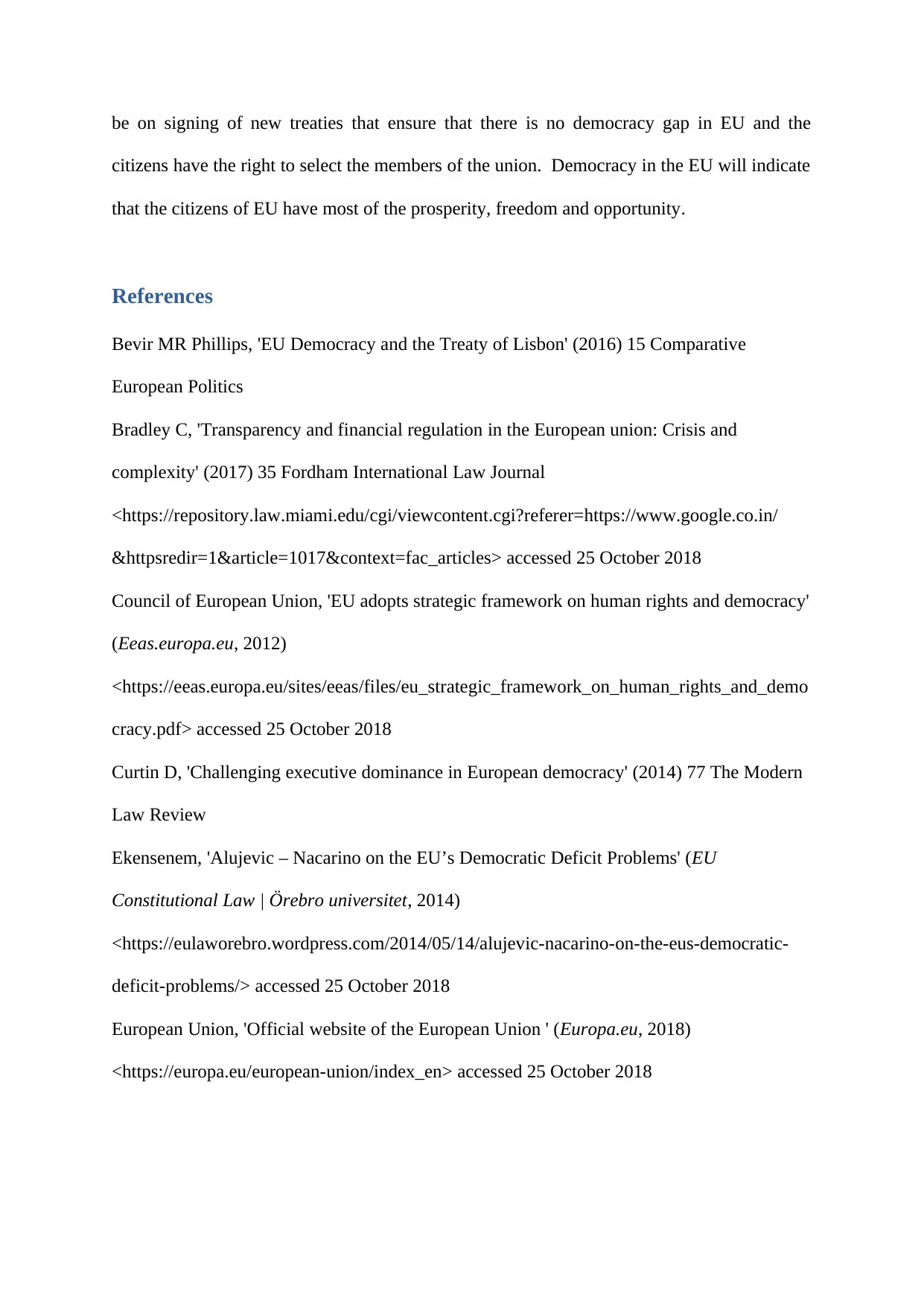
be on signing of new treaties that ensure that there is no democracy gap in EU and the
citizens have the right to select the members of the union. Democracy in the EU will indicate
that the citizens of EU have most of the prosperity, freedom and opportunity.
References
Bevir MR Phillips, 'EU Democracy and the Treaty of Lisbon' (2016) 15 Comparative
European Politics
Bradley C, 'Transparency and financial regulation in the European union: Crisis and
complexity' (2017) 35 Fordham International Law Journal
<https://repository.law.miami.edu/cgi/viewcontent.cgi?referer=https://www.google.co.in/
&httpsredir=1&article=1017&context=fac_articles> accessed 25 October 2018
Council of European Union, 'EU adopts strategic framework on human rights and democracy'
(Eeas.europa.eu, 2012)
<https://eeas.europa.eu/sites/eeas/files/eu_strategic_framework_on_human_rights_and_demo
cracy.pdf> accessed 25 October 2018
Curtin D, 'Challenging executive dominance in European democracy' (2014) 77 The Modern
Law Review
Ekensenem, 'Alujevic – Nacarino on the EU’s Democratic Deficit Problems' (EU
Constitutional Law | Örebro universitet, 2014)
<https://eulaworebro.wordpress.com/2014/05/14/alujevic-nacarino-on-the-eus-democratic-
deficit-problems/> accessed 25 October 2018
European Union, 'Official website of the European Union ' (Europa.eu, 2018)
<https://europa.eu/european-union/index_en> accessed 25 October 2018
citizens have the right to select the members of the union. Democracy in the EU will indicate
that the citizens of EU have most of the prosperity, freedom and opportunity.
References
Bevir MR Phillips, 'EU Democracy and the Treaty of Lisbon' (2016) 15 Comparative
European Politics
Bradley C, 'Transparency and financial regulation in the European union: Crisis and
complexity' (2017) 35 Fordham International Law Journal
<https://repository.law.miami.edu/cgi/viewcontent.cgi?referer=https://www.google.co.in/
&httpsredir=1&article=1017&context=fac_articles> accessed 25 October 2018
Council of European Union, 'EU adopts strategic framework on human rights and democracy'
(Eeas.europa.eu, 2012)
<https://eeas.europa.eu/sites/eeas/files/eu_strategic_framework_on_human_rights_and_demo
cracy.pdf> accessed 25 October 2018
Curtin D, 'Challenging executive dominance in European democracy' (2014) 77 The Modern
Law Review
Ekensenem, 'Alujevic – Nacarino on the EU’s Democratic Deficit Problems' (EU
Constitutional Law | Örebro universitet, 2014)
<https://eulaworebro.wordpress.com/2014/05/14/alujevic-nacarino-on-the-eus-democratic-
deficit-problems/> accessed 25 October 2018
European Union, 'Official website of the European Union ' (Europa.eu, 2018)
<https://europa.eu/european-union/index_en> accessed 25 October 2018
⊘ This is a preview!⊘
Do you want full access?
Subscribe today to unlock all pages.

Trusted by 1+ million students worldwide
1 out of 14
Related Documents
Your All-in-One AI-Powered Toolkit for Academic Success.
+13062052269
info@desklib.com
Available 24*7 on WhatsApp / Email
![[object Object]](/_next/static/media/star-bottom.7253800d.svg)
Unlock your academic potential
Copyright © 2020–2026 A2Z Services. All Rights Reserved. Developed and managed by ZUCOL.





